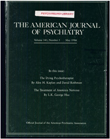Thyrotropin-releasing hormone (TRH) in abstinent alcoholic men
Abstract
Chronic alcoholics who had been abstinent from alcohol for more than 2 years were evaluated with the thyrotropin-releasing hormone (TRH) test. The findings suggest the following profound disturbances in the hypothalamic-pituitary-thyroid axis: 1) a "euthyroid sick syndrome," evidenced by low levels of triiodothyronine (T3), high levels of reverse T3, and normal levels of thyroxine (T4) (this syndrome implies a decreased 5'-deiodination of T4 to T3 and of reverse T3 to its lesser iodinated metabolites), 2) an increased binding capacity for thyroid hormones, evidenced by a decreased T3-uptake value and an increased level of T4-binding globulin, and 3) thyroid-stimulating hormone (TSH) blunting in 31% of patients. Paradoxically, there was a positive correlation between basal T4 and delta max TSH in subjects with blunted TSH, but baseline TSH levels were reduced in subjects with and without blunted TSH.
Access content
To read the fulltext, please use one of the options below to sign in or purchase access.- Personal login
- Institutional Login
- Sign in via OpenAthens
- Register for access
-
Please login/register if you wish to pair your device and check access availability.
Not a subscriber?
PsychiatryOnline subscription options offer access to the DSM-5 library, books, journals, CME, and patient resources. This all-in-one virtual library provides psychiatrists and mental health professionals with key resources for diagnosis, treatment, research, and professional development.
Need more help? PsychiatryOnline Customer Service may be reached by emailing [email protected] or by calling 800-368-5777 (in the U.S.) or 703-907-7322 (outside the U.S.).



